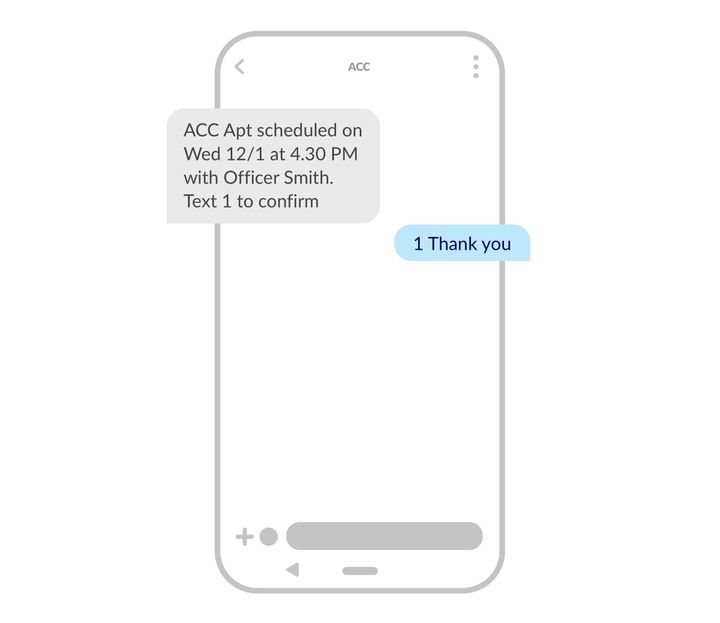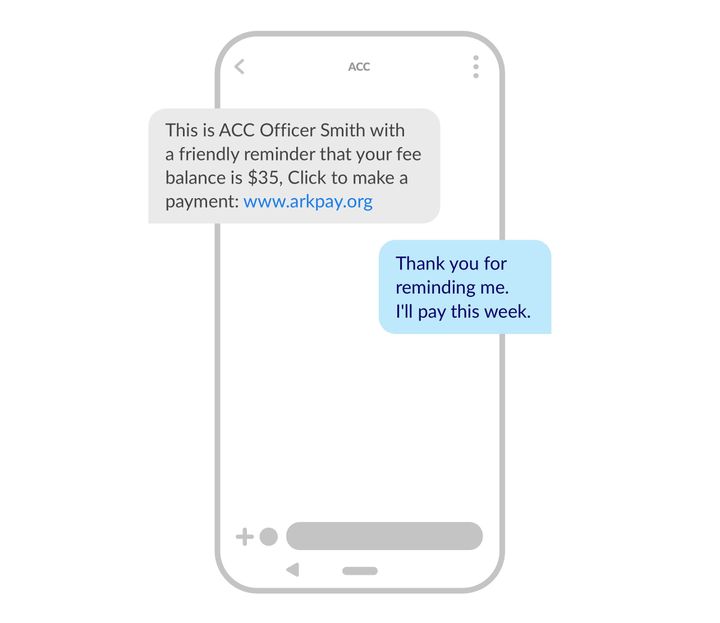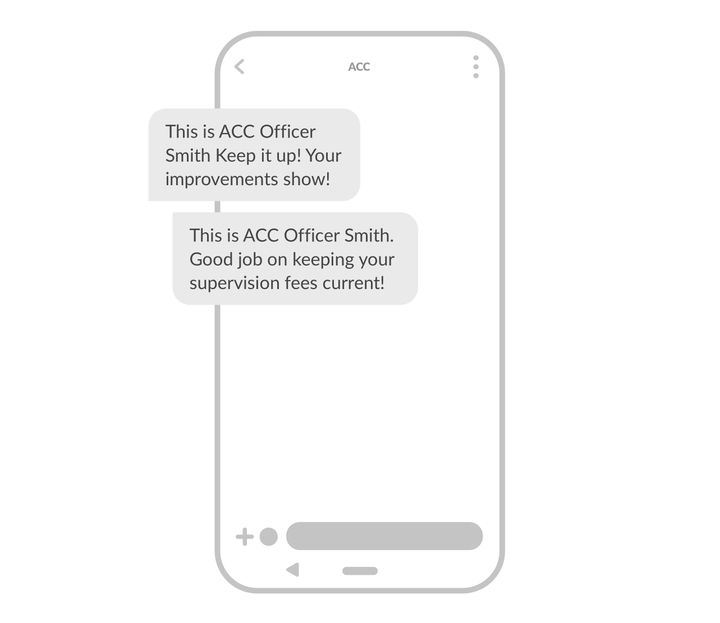SMS reminders study shows 43% reduction in parole no-shows for US probation officers

Marquis Software is a leading provider of Offender Management Systems.
For over 38 years, they have pioneered the enterprise-wide automation of corrections software with their electronic Offender Management Information System (eOMIS®). The eOMIS® system offers unsurpassed solutions for Inmate Management, Electronic Health Records and Community Supervision.
Marquis Software is the largest provider of Offender Management Software in the world and has been implemented in eight state Department of Corrections and over 16 county jails.
Dr. Stephen Payne, Director of Research and Development, explains how Marquis has become the industry leader, “We are committed to quality improvement, advanced research, and innovative use of the latest technology. One example of this is our InTouch Suite of mobile applications, which extends the power of the eOMIS® system to staff and parolees via smartphones and tablets. Another example is the research we sponsor on the effectiveness of our newest technology, such as text message reminders to reduce office visit no-shows.”
Are no-shows costly to your business?
Reduce missed appointments by adding SMS reminders today.

The Challenge
Managing parolees’ appointments is one of the key capabilities of the eOMIS® system.
Many of these appointments are critically important to ensure that past offenders continue on their path to remain addiction- or crime-free. Missing even one appointment can have a serious impact on an offender’s ability to retain their freedom.
One customer using Marquis eOMIS® platform – the Arkansas Community Corrections Agency – was experiencing a 20% rate of cancelled and no-show appointments with probation/parole officers. This was a colossal waste of time and effort for officers who were overburdened with caseloads, in addition to the serious consequences imposed on parolees for missing their office visits.
The research and development team at Marquis believed that using text messaging to deliver appointment reminders would be fast, effective and inexpensive to implement, and could help reduce the number of appointment no-shows.
The Solution
As they began to research text messaging solutions, Marquis knew they wanted to work with an organization they could trust, as the information they were sending was sensitive, timely and critically important.
They needed a robust API and a dependable tech support team with whom they could consult during each phase of development, testing, and production implementation.
Dr Payne notes, “After researching a few vendors, the decision to partner with MessageMedia was easy. The product was quickly integrated into our platform and it allows us to store a complete thread of all text-based communications in our database. Best of all, MessageMedia’s implementation and support team is responsive and invaluable. We could not have made a better choice, and we are planning to extend our use of text messaging to many more use cases across our platform.’
One of the first customers to begin using MessageMedia’s integrated text messaging system was the statewide parole system in Arkansas. The parole officers now have a tightly integrated text messaging capability where they can send ad-hoc messages to individuals or mass messages to a group of parolees.
Incorporating MessageMedia’s texting capabilities with our software has provided leading-edge functionality for both staff and clients in Arkansas.
Brian Strauch, Project Manager for Arkansas Department of Corrections, Marquis Software Development, Inc.
They can build queries within their database to send a targeted message to a specific group. Parole officers set up appointments using the eOMIS® system, and an automated batch job automatically sends out text notifications via the MessageMedia integration to remind parolees of their upcoming appointments, and requests a response to confirm the appointment.
Immediately after implementing the system, the Arkansas Community Corrections Agency saw a significant drop in missed appointments. They then experimented with additional use cases, such as sending text messages for fee payments reminders, dual-authentication verification codes, and links for installing the Intouch smartphone app.
Brian Strauch, the Marquis Project Manager for Arkansas Department of Corrections, described an even more interesting use case, “In 2019, the state of Arkansas experienced significant flooding in areas. They needed volunteers to help with sandbagging, so they queried the eOMIS® database to identify parolees living near the flooded areas. They then texted these individuals about their volunteer needs. The response for assistance was immediate, and they were able to recruit numerous volunteers to help with sandbagging efforts in the affected areas.
While text messaging was being implemented, Marquis and the Arkansas Department of Corrections decided they wanted to assess the impact of using SMS for appointment reminders, and to determine the most effective timing and frequency for sending these text messages. They wanted to understand when they should send texts, and how often.
Dr. Charise Hastings, Principal Researcher for Marquis, contacted criminal justice researchers from Drexel University and Rutgers University to design a randomized controlled trial to answer these questions, and to evaluate the results.
The trial ran for six and a half months, with a total of 4000 participants forming three treatment groups and one control group. Some received a text message the day before the appointment; some, two days before the appointment; and some received text messages four days and one day before the appointment.
Examples of text messages



The Results
The texting feature of eOMIS® has been a game-changer.
Nicholas Stewart, Shared Services, Human Resources and Training Administrator, Arkansas Department of Corrections
According to Arkansas Department of Corrections Human Resources and Training Administrator Nicholas Stewart, “ [Texting is] assisting our agency to operate with evidence-based practices. We have “blasted” messages to offenders for job fairs, office closures, good job kudos, and financial obligation reminders. I’ve seen an offender’s eyes light up with joy when they got a kudos text. We no longer have to purchase appointment slips, which saves money. Texting allows the offender to be held much more accountable for meeting appointments and financial obligations.”
While the full report is available via this link, here is a summary of some of the conclusions.
- Frequency: The study determined that sending one text message the day before the appointment was the most efficacious option. For the cost of one text message, there were 43% fewer no-shows, compared to the control group that received no text message notification.
- Appointments Held: The rate of appointments held was higher for all groups that received text message notifications, no matter when it was sent.
- Conclusion: Considering the low cost of providing these reminders, the researchers concluded it would be prudent to send text message appointment/confirmation reminders to everyone under community supervision as a matter of standard agency policy.
After ACC implemented text messaging statewide, results across the board were consistent with the results from the trial. The return on investment has proven significant, with both short- and long-term savings that include reduced officer time wasted, and fewer parolee violations.
Texting is beneficial because of its convenience. It allows officers to choose different types of messages to send. It’s the most effective way to reschedule appointments because it assures officers that messages are delivered.
Detonda Woolfolk, Probation and Parole Officer, Arkansas Division of Community Correction
Future use cases
According to Dr Payne, “The Marquis team made the right choice in selecting MessageMedia as a partner. The API is well-documented and easy to use. Its tremendous flexibility has allowed us to implement every idea we’ve had. For instance, we used the callback feature to create real-time text message threads, similar to email conversation threads. In addition, whenever we’ve had a question, the tech support team has responded quickly with helpful and clear answers. “
Marquis is exploring additional ways to integrate text messaging with their suite of mobile applications. One app is designed to help parolees succeed by providing relevant information about their conditions of supervision. As parolees interact with the app, text messages will be triggered to remind them of their appointments, goals, and tasks at opportune times throughout the week.

